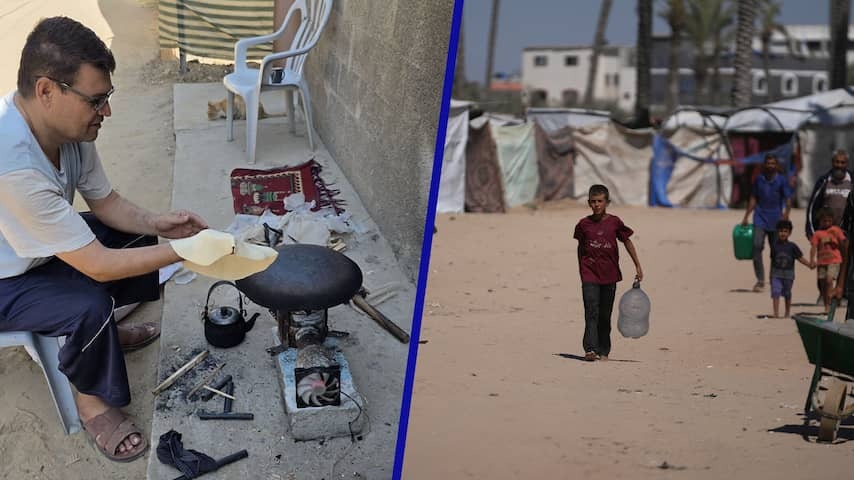
In Deir Al-Balah in Gaza, the search for food is becoming increasingly difficult. Rezeq Awad barely finds anything to make bread from on a wood fire. “I hope my children grow up with more than the smell of firewood,” he says in an interview with NU.nl.
“Today is normally a day of rest,” says Rezeq. “But now I’m trying to bake bread and help with chores.” The fifty-year-old Rezeq is a shelter manager for CARE in Gaza. He works in camps and primarily concerns himself with water, hygiene, and shelter for people who arrive.
Baking bread is a challenge. In his search for food, Rezeq only finds some lentils, pasta, and a handful of flour. “Just enough flour to hold the bread together,” he says. Flour is almost impossible to find. And if it is available, it is sold for 12 dollars (over 10 euros) per kilo. “That’s more than most people here earn in a day.”
On a makeshift wood stove, with his eyes in the smoke, Rezeq bakes a kind of flatbread. Without oil, because that’s gone. It’s not nearly enough for his family with six children. “We need three kilos of flour per day,” he emphasizes. So a handful of flour is far too little.
The device Rezeq bakes on looks like an inverted wok pan. Underneath is a wood stove, a necessity because there has been no gas for months to cook on. “The smoke stays in our clothes, our hair, and our walls. I hope our children grow up with the memory of flavors, and not just firewood.”
‘We have become accustomed to it’
Rezeq tries not to think about sandwiches with falafel, tomato, and pickle. “We can’t afford that anymore, if we can even find it. Even such a simple meal has become out of reach.”
But the hardships go beyond just food. “We haven’t had running water for over two weeks,” says the aid worker, while trying to fill a small jerrycan at a water point. He and his family walk back and forth every day with jerrycans to fill the water tank on the roof of their house. “That way, we can flush the toilet and wash our hands.”
Then there are, of course, the shortages of medical supplies and children who are too tired to cry. Also, the attacks by Israel continue. Even on the only – still partially – operating hospital in Deir Al-Balah, the Al Aqsa hospital, Rezeq says. Images show victims of an Israeli attack lying on the ground. Some are still alive, but many are not.
“We have become accustomed to it,” says Rezeq. “Just as we have become accustomed to everything else that we never thought we would have to endure.”
‘It’s about dignity’
It’s just a glimpse into the life of a Palestinian, says Rezeq while making tea on that same wood stove. “Everyone in Gaza is in survival mode. We are all cooking outside now, squatting by wood fires, with smoke in our eyes, trying to stretch one more meal for the next day.”
But it’s not just about hunger. “It’s about dignity, about how much has been taken from us.” Rezeq is glad that he can do something for the huge influx of people who have even less than he does. But he also feels that there is less and less of everything.
Yet Rezeq continues. “We’re managing. We share the little we have. And we hold on to the hope that one day we can eat without having to watch every crumb.”